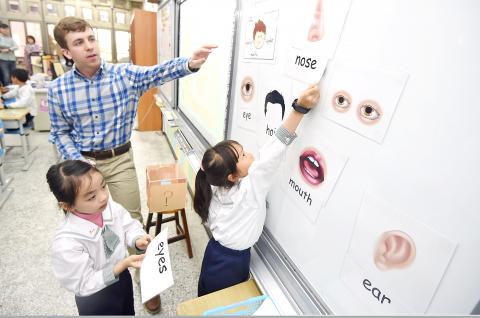Education officials last month proposed making oral English tests part of college entrance exams and establishing English-language TV channels to boost the public’s English skills as the Ministry of Education worked on plans to realize Premier William Lai’s (賴清德) goal of making English an official language
The officials made the proposals at a ministry conference about English proficiency in Taipei, where College Entrance Exam Center Director Liu Meng-chi (劉孟奇) said that oral English proficiency tests should be included in public university entrance exams.
“China is poised to implement such tests in the next two or three years and Hong Kong has done so many years ago,” he said. “To maintain its international competitiveness, Taiwan must not fall behind in English proficiency.”

Photo: Chien Jung-fong, Taipei Times
The Test of English as a Foreign Language and other privately administered English tests use voice recordings of the test taker for grading, which is a method the center could adopt, Liu said.
If such tests were conducted concurrently with English listening comprehension tests or the General Scholastic Ability Test, applicants would not have to spend days taking exams, he added.
If the proposal is accepted, the center would need five years and NT$3 billion (US$97.28 million) to establish standardized test venues at 300 to 500 schools, Liu said.
The ministry does not have a definite plan on the form of the oral test or grading methods, Department of Higher Education Director-General Chu Hung-chang (朱俊彰) said, adding that the center and the Joint Board of College Recruitment Commission would convene to discuss the matter.
The ministry said it would launch courses taught exclusively in English at colleges and universities.
Mandatory English courses would be organized by proficiency level at more than 80 percent of colleges and universities, while 85 percent of the institutions would leverage dual-degree programs, it said, adding that an all-English learning environment would be created with the help of foreign academies and international degree programs.
Workplace English classes should be taught at vocational and technical schools, which are responsive to specific professional needs, the ministry said.
English courses offered at technical or vocational colleges should be adaptable to individual needs, provide adequate remedial classes and evaluate performance by metrics that reflect what the students would need in their line of employment, it added.
It would work with other government agencies to promote English proficiency, the ministry said.
Possible projects include establishing a national English-language radio or TV station jointly with the Ministry of Culture to broadcast shows with English subtitles, the education ministry said.
The officials also proposed working with the Executive Yuan to encourage local governments to recruit volunteers to provide bilingual services, such as teaching English to elderly people or helping people read English-language books in libraries.

PRAISE: Japanese visitor Takashi Kubota said the Taiwanese temple architecture images showcased in the AI Art Gallery were the most impressive displays he saw Taiwan does not have an official pavilion at the World Expo in Osaka, Japan, because of its diplomatic predicament, but the government-backed Tech World pavilion is drawing interest with its unique recreations of works by Taiwanese artists. The pavilion features an artificial intelligence (AI)-based art gallery showcasing works of famous Taiwanese artists from the Japanese colonial period using innovative technologies. Among its main simulated displays are Eastern gouache paintings by Chen Chin (陳進), Lin Yu-shan (林玉山) and Kuo Hsueh-hu (郭雪湖), who were the three young Taiwanese painters selected for the East Asian Painting exhibition in 1927. Gouache is a water-based

A magnitude 4.1 earthquake struck eastern Taiwan's Hualien County at 2:23pm today, according to the Central Weather Administration (CWA). The epicenter of the temblor was 5.4 kilometers northeast of Hualien County Hall, at a depth of 34.9 km, according to the CWA. The earthquake's intensity, which gauges the actual effect of a temblor, was the highest in Hualien County, where it measured 2 on Taiwan's 7-tier intensity scale. The quake also measured an intensity of 1 in Yilan county, Taichung, Nantou County, Changhua County and Yunlin County, the CWA said. There were no immediate reports of damage or injuries.

OFF-TARGET: More than 30,000 participants were expected to take part in the Games next month, but only 6,550 foreign and 19,400 Taiwanese athletes have registered Taipei city councilors yesterday blasted the organizers of next month’s World Masters Games over sudden timetable and venue changes, which they said have caused thousands of participants to back out of the international sporting event, among other organizational issues. They also cited visa delays and political interference by China as reasons many foreign athletes are requesting refunds for the event, to be held from May 17 to 30. Jointly organized by the Taipei and New Taipei City governments, the games have been rocked by numerous controversies since preparations began in 2020. Taipei City Councilor Lin Yen-feng (林延鳳) said yesterday that new measures by

‘WORSE THAN COMMUNISTS’: President William Lai has cracked down on his political enemies and has attempted to exterminate all opposition forces, the chairman said The legislature would motion for a presidential recall after May 20, Chinese Nationalist Party (KMT) Chairman Eric Chu (朱立倫) said yesterday at a protest themed “against green communists and dictatorship” in Taipei. Taiwan is supposed to be a peaceful homeland where people are united, but President William Lai (賴清德) has been polarizing and tearing apart society since his inauguration, Chu said. Lai must show his commitment to his job, otherwise a referendum could be initiated to recall him, he said. Democracy means the rule of the people, not the rule of the Democratic Progressive Party (DPP), but Lai has failed to fulfill his